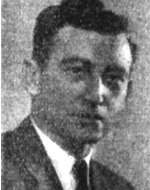Hoffman, Shmuel-Dov
Son of Yocheved and Jacob, was born on December 12, 1913, in the city of Tzebinia, Poland. At the outbreak of the First World War, his family fled to Germany and settled in the city of Sittau. Where he began studying in a German school, but his father wanted to educate him and sent him to Dresden and then to Heberstadt, where there were established Jewish communities. In 1925 the entire family immigrated to Israel, settled in Ra’anana and was one of the first builders. Shmuel Dov studied in the local elementary school and worked in his parents’ agricultural farm, where they invested their best resources and wealth to improve and improve them. After a while his father had to sell the farm because it could not support the family. Dov (as he was briefly called) continued his career as an agricultural laborer, then worked as a construction worker in a construction group in Ra’anana, and eventually studied mechanics and mechanics and specialized in these subjects. From his youth he was an active member of the Haganah. During the 1936-1939 riots he enlisted as a driver in armored cars escorting the potash leaders on the Jerusalem-Jericho road and later served as a pickup driver in the Ramat Hakovesh and Kfar Sava settlement police. In 1942 he enlisted in the British Army for a unit of workshops and over time rose to the rank of sergeant (sergeant) and director of a workshop. He crossed the western desert front from Egypt to Tripoli and from there to Sicily and Italy. When the Jewish Brigade was established, he joined it immediately and during his service he devoted himself wholeheartedly to the rescue of the Holocaust refugees, to help the needy and to establish contact between them and their relatives in Israel. In recognition of his devotion to the rescue operation, trees were planted in his name in one of the forests of the Jewish National Fund. During the visit of Moshe Sharett (then director of the Political Department of the Jewish Agency) in the Jewish Brigade Dov was among his escorts. In July 1946, after his discharge from the army, he was accepted as a member of the “Egged” cooperative and after a while he married and settled in Kfar Yona. There he had a daughter. Shmuel Dov was fond of his surroundings and was respected by all his knowledge as an honest man, loving the homeland, courageous and devoted to his functions, cheerful, full of life and full of energy. These qualities accompanied him throughout his service during the War of Independence. Shmuel-Dov fell in Latrun on May 31, 1948, while he was transporting Palmach reinforcements to besieged Jerusalem and was brought to rest at the military cemetery in Petah Tikva.
